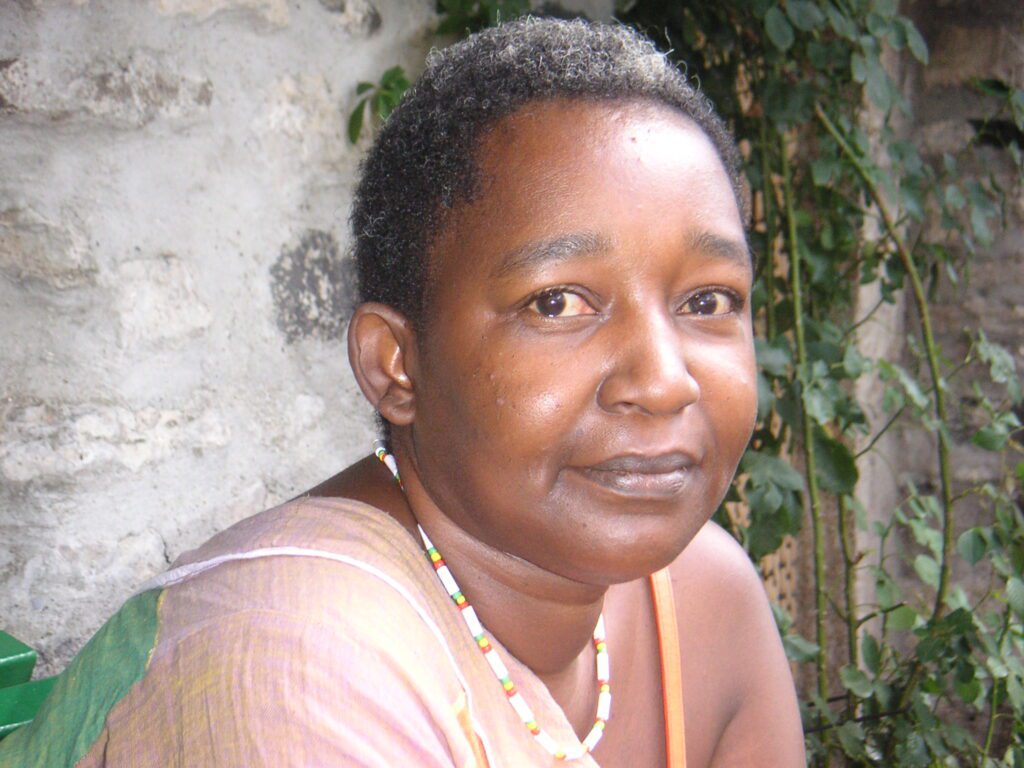2023 FESTIVAL FOCUS SAFI FAYE & KHADY SYLLA
The 2023 edition of the CINEFEMFEST symposium-festival has a theme: ‘Legacies’ in that it celebrates the work of Senegalese filmmakers Safi Faye and Khady Sylla, pioneers of African cinema, both deceased. The festival, which will start on the morning of June 16 and end on the evening of June 18 , will zoom in on the gigantic work of these two immensely talented filmmakers, who are still very little known despite their phenomenal filmography and which constitute a rich legacy for African feminists. The CINEFEMFEST symposium-festival will include film screenings and will be punctuated by panels and discussions on the work of these two authors. The event is held on the island of Gorée, in partnership with Gorée Cinéma. We know we can count on your presence and your contributions to make this festival a great moment of exchange and sharing around cinema made and seen by feminists.
Khady Sylla and Safi Faye, these names should resonate in our collective imagination for being pioneers in African Cinema. Due to their work, craft and lives, they are an inspiration to young feminist researchers like us. They carried the torch of women ahead of their time, destined to be muses (égéries). The burden was too heavy! They didn’t pass it on to the following generations of women cinematographers, because of structural setbacks inherent to cinematographic production and in the case of Khady Sylla, a premature death. We are thus left hungry, yearning for possibilities of what should have been. Or what could have been, were they celebrated the same way as the much-(monstrously?) talented and rightly celebrated Ousmane Sembene.
Safy Faye’s body of work shows her interests for the rural world, the weight of traditions, women’s emancipation and economic independence in the Serer society of Senegal. She has directed overall thirteen films: La Passante (1972), Revanche (1973), Kaddu Beykat (Lettre Paysanne) (1975), Fad’jal (1979) Goob na nu (La Récolte est Finie) (1979), Man Sa Yay ( 1980), Les Âmes au Soleil (1981), Selbé et Tant d’Autres (1982), 3 ans 5 Mois (1983), Ambassades Nourricières (1984), Racines Noires (1985), Tesito (1989), Tournage Mossane (1990 ) and Mossane (1996).
In her production, Khady Sylla juggles words, clings to them, they keep her alive. Khady’s first work, ‘Les Bijoux (1998), documents a familial crisis. In Colobane Express (1999) she captures the experience of urban transportation, showcasing a Car Rapide (public car) driver and his apprentice. Her last film, Le Monologue de la Muette (2008) sheds a light on the conditions of domestic workers. Beforehand, Khady Sylla published a superb novel edited by L’Harmattan: le Jeu de la Mer (1992).

Safi Faye: The Pioneer
Safi Faye, born november 22 1943 is a major figure of African Cinema, a great Senegalese filmmaker and ethnologist. Safi graduated from Ecole Normale Supérieure de Rufisque in Senegal. She then worked briefly as a teacher before landing a role in the film Petit à petit (1971) by a renowned French anthropologist. Safi then started working on what appeared to be her vocation, crafting, writing and making films. She trained in cinematography at the Louis Lumière school in Paris (1969-1980), takes ethnology and anthropology classes
from EHESS (Ecole des Hautes Etudes en Sciences Sociales, Paris) and defends in 1979 a doctoral thesis on the religion of the Sereer.
Cinema allows her then to write for her mother who has never been to school. So she wrote films for her mother to be able to read. Safi Faye is a pioneer of African cinema. She researched and wrote extensively
on her culture, the Senegalese social fabric and women’s conditions on the backdrop of rural life. She said in a 2006 interview with M’barek Housni that she wanted to have the opportunity to give the floor to her kinfolk, to write for the African peasantry. She thus makes the first long métrage made by a woman in 1975, Kaddu Beykat. The film received international acclaim and was awarded many distinctions among others the Best first film award at the Festival de Cannes in 1976 .
Safi’s work is at the same time poetic and realistic, she wanted to subscribe to the lineage of Senegalese authors in cinema whose work are “still valuable, are undated and become classics”. To Safi, researching and writing is demanding, minute. She spent 8 years in the making of Mossane and had to fight some
more years for the rights of her film to be given back to her. Safi Faye died on February 22 2023, after a fulfilled life, that of a fighter, a creative who devoted her life to cinema, to show Africa on other terms and to
document the living conditions of women; She made overall 13 films, an essential contribution to World cinema and an invaluable legacy for the next generations of women filmmakers, from Senegal,
Africa and beyond.

KHADY SYLLA: THE BEAUTIFUL MIND
Khady Sylla was born on March 29, 1963 in Dakar. Khady Sylla had an immense contribution to cinema and literature, a work which is still unknown to the greater Senegalese public.
After her baccalaureate in Dakar, Khady Sylla moved to Paris to study commerce. She dropped out and joined Hypokhâgne (literary preparatory classes) where she completed a degree (bachelor) in philosophy. After working shortly as a translator, she evolved in an environment of artists, stylists, musicians, authors, a period during which she wrote scenarii.
Khady started writing steadily after her grandmother passed away, to bring her out of annihilation. She produced her first short story, L’Univers, published in 2000. Then, the seeds of cinema were already planted, thanks to her mother, secretary to the director of cinematography. As a child, Khady watched “the first African films projected on white sheets at home”.
Throughout her writing career, Khady strived to produce strong and original works. With the aim of reclaiming “the word that had escaped”, la parole, “the vehicle of all knowledge”. Khady wrote: screenplays, short stories, novels, films. She questioned the world, mused on the universe, and showed the complexity of the human mind and human relationships. Her work thus shows the daily life of ordinary people, maids, the mentally ill. Khady Sylla produced 5 films, a novel and numerous unpublished writings. She was, in a word, a femme de lettres who is not much talked about but who [had] a lot to say.
Khady Sylla died on October 8, 2013 in Dakar, leaving behind an immense legacy for younger generations.


